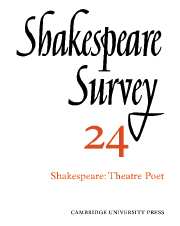Book contents
- Frontmatter
- Hearing Shakespeare: Sound and Meaning in ‘Antony and Cleopatra’
- ‘More Pregnantly Than Words’: Some Uses and Limitations of Visual Symbolism
- Shakespeare and the Limits of Language
- Revenge, Retribution, and Reconciliation
- Shakespeare the Professional
- Shakespeare’s Talking Animals
- The Morality of ‘Love’s Labour’s Lost’
- Shakespeare’s ‘Earth-treading Stars’: the Image of the Masque in ‘Romeo and Juliet’
- ‘Hamlet’ and the ‘Sparing Discoverie’
- ‘Hamlet’ in France 200 Years Ago
- The Hamlet in Henry Adams
- ‘Pericles’ and the Dream of Immortality
- A Necessary Theatre: The Royal Shakespeare Season 1970 Reviewed
- Free Shakespeare
- The Year's Contributions to Shakespearian Study 1 Critical Studies
- 2 Shakespeare’s Life, Times, and Stage
- 3 Textual Studies
- Index
- Plate section
The Year's Contributions to Shakespearian Study 1 - Critical Studies
Published online by Cambridge University Press: 28 March 2007
- Frontmatter
- Hearing Shakespeare: Sound and Meaning in ‘Antony and Cleopatra’
- ‘More Pregnantly Than Words’: Some Uses and Limitations of Visual Symbolism
- Shakespeare and the Limits of Language
- Revenge, Retribution, and Reconciliation
- Shakespeare the Professional
- Shakespeare’s Talking Animals
- The Morality of ‘Love’s Labour’s Lost’
- Shakespeare’s ‘Earth-treading Stars’: the Image of the Masque in ‘Romeo and Juliet’
- ‘Hamlet’ and the ‘Sparing Discoverie’
- ‘Hamlet’ in France 200 Years Ago
- The Hamlet in Henry Adams
- ‘Pericles’ and the Dream of Immortality
- A Necessary Theatre: The Royal Shakespeare Season 1970 Reviewed
- Free Shakespeare
- The Year's Contributions to Shakespearian Study 1 Critical Studies
- 2 Shakespeare’s Life, Times, and Stage
- 3 Textual Studies
- Index
- Plate section
Summary
There is some indication that in recent years more critics are prepared to tackle the whole range of Shakespeare’s achievement. The first two parts of what will ultimately be such a general critical account have appeared from Gareth Lloyd Evans. The plan is to follow the dramatist’s career more or less chronologically, with volume I being devoted to the years 1564–92, and volume II 1587–98. Together they represent about as good a commentary on the early and middle plays as one could find for the intelligent non-professional reader of Shakespeare. Certainly they aim at offering in a very readable manner the accepted state of scholarly knowledge; but at the same time they contain a very personal approach to the works which is based upon theatrical as well as classroom expertise and which never becomes merely eccentric.
In discussing the early plays, Lloyd Evans displays his critical strengths best in the essays on the Henry VI plays. He conveys well just how dramatically 'promising' these works are, demonstrating the way in which the larger political issues are located in single scenes and details of character, perceiving the thematic and theatrical relationships between Joan and Talbot or Cade and Gloucester, explaining with real insight the dramaturgical problems which faced Shakespeare in part 3, and in general managing to move gracefully between abstracted ideas and detailed analyses of particular passages.
- Type
- Chapter
- Information
- Shakespeare Survey , pp. 137 - 154Publisher: Cambridge University PressPrint publication year: 1971



